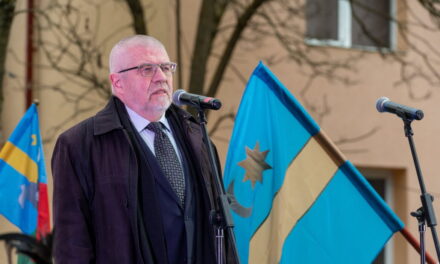For the Hungarian community in Slovakia, one party is the institutional representation - the vice-president of the united Hungarian party of the Uplands, the Association, stated in the current program of the M1 channel on Monday morning.
Speaking live from Slovakia, Mózes Szabolcs said about the stakes of the early Slovak election on September 30: if there is a Hungarian party in the parliament, it means that the Hungarians have a parliamentary faction, and they also "have a seat" in the coalition council.
He emphasized: the Association is prepared, they have the priorities with which they can participate in a coalition negotiation. Among these, he mentioned the minority law, which, according to Mózes Szabolcs, is already a twenty-year debt to Slovakian politics. In addition, they plan to develop southern and eastern Slovakia by continuing highway construction and modernizing the railway, he added.
The vice-president of the Association noted: Hungarian parties have been in government in Slovakia several times in the past twenty years, and have always been a stabilizing force in government coalitions.
Mózes Szabolcs feels that the Slovak society is prepared for it, and the Slovak analysts and the parties also see that if the Hungarian representation enters the parliament, it will become a governing force.
Political scientist Tamás Lánczi, analyzing the data of Slovak public opinion polls in the studio, said: the forces that participated in the government most recently are being punished by Slovak voters. Slovakia has deviated from the path it was on for five to ten years, its economy is struggling with serious problems and it has "descended into total domestic political chaos".
He pointed out: Robert Fico's party is the most popular, but with a 24 percent result, it is not possible to obtain a majority in the Slovak electoral system either.
Thus, since the president will give the party with the most mandates the opportunity to form a government, the question will be whether Robert Fico will find a coalition partner.
Tamás Lánczi later commented on the fact that the Association gained three new mayors in the interim municipal elections in Slovakia at the weekend: it appears that there are viable Hungarian communities in southern Slovakia that are able to organize themselves and establish representation.
Radio Kossuth Good morning, Hungary! In his program, political scientist László Öllős highlighted that the stake of the early election in Slovakia is stable governance. He called the past years an alarming example of disintegrating governance and indecision.
The Hungarians in the highlands did not have parliamentary representation for years, and the political scientist would consider it important to once again have an organized force that can have a say in the decisions due to the development of the southern part of the country.
MTI













